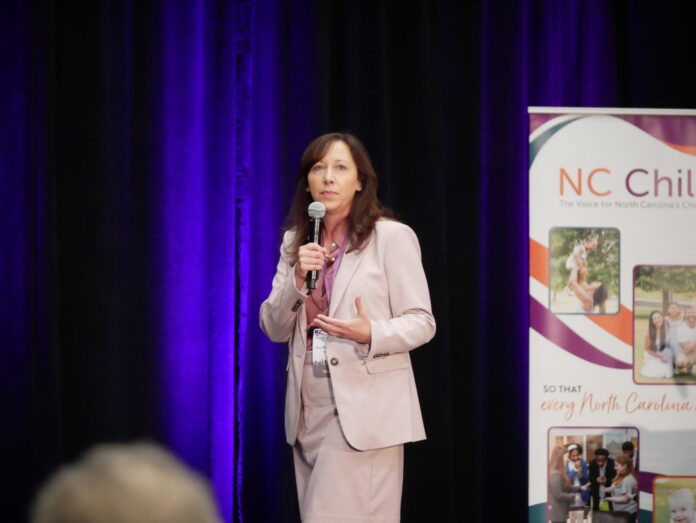NC Child and the North Carolina Institute of Medicine cohosted the second annual State of the Child Summit on April 15th. The summit featured remarks by Gov. Josh Stein, Lt. Gov. Rachel Hunt, Sen. Thom Tillis via video, NCDHHS Secretary Devdutta Sangvai, Rwenshaun Miller, author Dan Wuori, and a keynote by Cynthia Osborne.
Erica Palmer Smith, executive director of NC Child, also delivered the annual State of the Child Address. In her remarks, Smith challenged North Carolina to be “first in children.”
“We should put children first because they represent our humanity and our innocence,” Smith said. “And because they represent our future. Today’s children are our future. And if we believed in that future, we’d invest in it.”
The following is a copy of her address.
Good morning! It’s an honor for me to be up here. At NC Child, our mission is to improve the lives of North Carolina’s children. And we know that’s a shared mission.
We are thankful to each of you for being part of this summit: the advocates, the legislators, the friends who have dedicated their lives to this work, and those of you who are still children at heart.
We hope that you enjoy the programming, that you learn something new, and that you find opportunities to build your networks. But we also thought that the summit should be more than just the sum of all those parts. Our goal is to inform you and to engage you. But also, we hope to inspire you.
Last year we said that the State of the Child was “to be determined.”
And there’s something to that.
Just look around these days. The world is changing. The issues are changing. Today’s children face different challenges than we did. And we’re all just trying to catch up. But what if we did more than that? What if we started setting the agenda for a change? That’s the purpose of the State of the Child Summit. We want it to be a conversation starter — and a call to action.
As we were preparing for this address, we tossed around ideas for what the theme should be. And someone asked, “What if North Carolina was first in children, you know, like the Wright Brothers?”
At first I was like, ok. That sounds a little silly. But then we thought about it more. And why not?
North Carolina takes pride in being first. We’re first in flight. We’re first in freedom. We’re one of the best states in the country to do business. We have a world-class university system. The best barbecue. The best college basketball. I could go on… But what about children? What are we doing for them? How are they doing?
And the truth is that North Carolina has work to do when it comes to the lives of our children.
There are positives that we should celebrate. For instance, teen births are down. And substance use is down historically. Children’s health insurance coverage is near a record high, and our graduation rate is near the highest it’s ever been. And those deserve applause. They wouldn’t have happened without the people in this room.
There are also issues that we need to address as a state.
Almost 40% of our children live in poor or low-income homes. And one in five live in households that are food insecure, that means over 400,000 of our children going to bed and waking up hungry.
We made it through the pandemic, but now we’re seeing the effects on school suspensions, absenteeism, and juvenile delinquency. And reading and math scores are still down from where they were before.
Today, the majority of our third graders in North Carolina are not proficient in reading. And if that’s not a rallying cry, we don’t know what is.
But there are other challenges too.
Today NC Child and NCIOM released the latest Child Health Report Card with a focus on school-based mental health. And that’s another issue of concern. We don’t have enough school support staff to meet the needs of today. With everything going on regarding youth mental health, that’s an area that we have to improve.
And we need other improvements. There are still children and families recovering from Hurricane Helene. There are still disparities based on what a child looks like or where they live.
So that brings us back to our theme. What if we were first in children? What would that mean?
According to the Kids Count data book, North Carolina is 33rd overall for issues affecting our youth. That’s not good enough. We should want to do well in that ranking and in every indicator. But across the country, literacy rates are down, and youth depression is on the rise. We should strive to be the best, but we should also strive to set our own standards. And that’s what we’re trying to do.
At NC Child, we track the data, and we share it. Together we see the results, and sometimes we get frustrated. It becomes a cycle. And that’s why being first should be more than a slogan or a metric.
It should be a vision that’s uplifting and unifying. It should be a value system, a set of principles, and a way to live. Being first in children means putting children first. Because that should be the point.
For all the changes that came after the Wright Brothers — from going to space to creating the internet — at times we have forgotten the “why” of it all, which is supposed to be making life better for our children.
And that’s what we need to get back to today. There is a saying, “The greatest responsibility of any generation is to take care of the generations that follow.” And what if we started acting like it again?
What if we built neighborhoods for children and not just cars? They’d be full of playgrounds.
What if social media algorithms weren’t so dangerous for our teenagers?
What if we made it easier for young parents to care for a child? Or to have one in the first place?
I have 15 nieces and nephews and the best daughter in the world. I cannot imagine life without them.
But today, birth rates are down in North Carolina. Families are putting off having children because of how hard it’s become. And we should try to make it easier.
We should address the barriers to having children — from housing costs, to child care access, to paid parental leave. We should also address the needs of the children who are living today.
There are over two million children in North Carolina.
And we should be thinking about what they need from us right now.
Today’s children need more protection online but more opportunities in the real world. They need less pressure but more responsibility. They need more role models and fewer influencers.
They need decent homes to live in, enough food to eat, and places to go after school.
They need joy and play. And they need parks to play in. They need values too.
They need us to instill those values. Though at times it feels like we’re setting the wrong example. That’s why we need more healthy outlets for our youth and fewer vape shops on the street corner.
And there’s another danger. Today’s teens spend over four hours a day on social media. And that’s not good for their development or their mental health. Imagine if we got those hours back. Imagine the difference that would make. But to do that, we need to model good behavior.
And that’s something we can do. Starting now. Starting today.
We should put children first because they represent our humanity and our innocence. And because they represent our future. Today’s children are our future. And if we believed in that future, we’d invest in it.
That’s what we want: school support staff, suicide prevention training, telehealth counseling, and investments in early childhood that benefit parents, providers, and the child care workforce.
We have ideas. But we cannot do this alone. That’s where you come in. Everyone who has partnered with us to help give North Carolina’s children a voice.
We thought, what if we bring them all together, for the ideas and the networking, and for the shared sense of purpose? North Carolina has a history of achievement. And we want this state to do that again.
Being first in children. That sounds hard. It’s supposed to be. Because it’s a way for us to lead.
What if North Carolina was first in early childhood — like a legislator recently proposed? Think of what that would do for our communities and their economies and families just trying to make it all work.
Or take the issue of youth mental health. The statistics are alarming. It doesn’t have to be this way. And we have the power to solve this crisis. But we need to believe that we can.
Many of us were part of the effort to expand Medicaid. That took a few years — and a few years off my life. And now we’re all doing everything we can to keep it.
But we proved that by working together and not giving up, we can do big things in our state.
Today is a reminder of that.
Today is the 65th anniversary of the founding of the Student Nonviolent Coordinating Committee just a few blocks from here on the campus of Shaw University. On that day, a group of young people took on a challenge, powered the Civil Rights movement, and changed the course of history.
Good things happen when people get together here.
And we want you to feel that same sense of hope. If you’re showing up to a children’s summit on a Tuesday, that already means you care. You got into this work because of children you know or because of someone who helped you out when you were a child. You’re here for a reason.
Maybe you didn’t set out to change the world. But you wanted to make it a better place. And that matters. We want you to hold on to those dreams. Because those dreams keep us going.
Later today we’ll ask you to make a commitment: One small act you can do in the next week.
They won’t solve everything. But they will add up. And that’s how change begins.
We want to be first in children not for a ranking or an indicator. We want to be first in effort and enthusiasm. We want to do what is hard and we want to achieve the impossible.
Because that’s what the Wright Brothers did.
The Wright Brothers climbed up the same sand dunes thousands of times trying out their glider. It wasn’t easy trying to do something that had never been done before. But they kept learning.
And then it happened. The first flight lasted 12 seconds and went 120 feet. But it changed everything.
And that should be our lesson. It wasn’t about the how. It was about the hope. It was the belief that anything is possible. And that’s the sprit we hope you bring to this summit.
It’s time for North Carolina to make history again.
It’s time for us to lead again.
It’s time for us to be first in children.
And we do that by never giving up.
Thank you.





